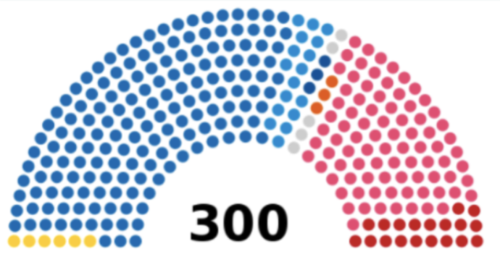In the election for South Korea’s National Assembly held on April 15, 2020, the ruling left-wing Democratic (Minju) Party emerged victorious with a supermajority of seats.
Of the 300 seats in the National Assembly, the Democratic Party won 180, and the conservative opposition United Future Party won 103, which is expected to greatly increase the power of President Moon, Jae-in during the second half of his term.
In particular, the Democratic Party’s supermajority of seats in the National Assembly will enable it to push through the enactment and amendment of all bills, except for constitutional amendments, without the need for negotiations with or votes from the opposition.
It is feared that the results will allow the Moon regime to further implement its socialistic economic policies as well as its China-friendly and North Korea-friendly foreign and national security policies.
This election marks the fourth consecutive victory of the Democratic Party following the 2016 the legislative election, the 2017 presidential election, and the 2018 local election, indicating a decline in the fortunes of conservative parties and forces in South Korea.
Of those elected, 155 were non-incumbents, more than half of the total of 300, and the number of female members increased slightly from 51 to 57. The average age of this new
National Assembly will be slightly younger, from 55.5 years old before to 54.9 years old now.
Another very significant result of this election is that two North Korean defectors won seats in the National Assembly. Tae, Gu-min (better known as Thae, Yong-ho, a former London-based North Korean diplomat), was elected as a member of the United Future Party from Gangnam-gu, Seoul, and Ji, Sung-ho (honored by President Trump in his 2018 State of the Union speech), was elected as a proportional representative of the United Future Party.
Observers will be paying keen attention to the political jockeying which will take place over the next two years, in the lead up to South Korea’s presidential election in 2022.



